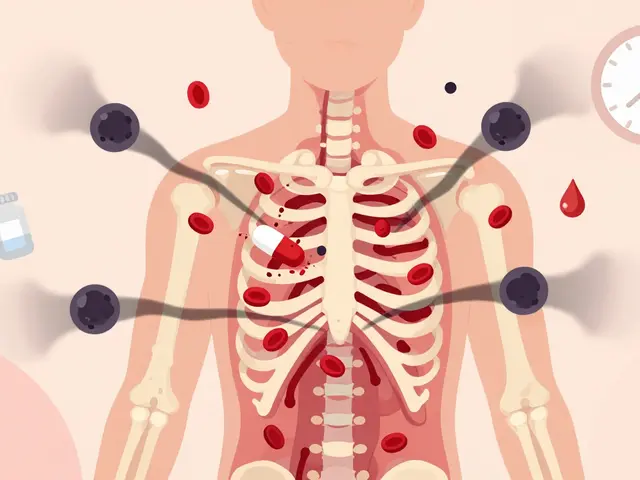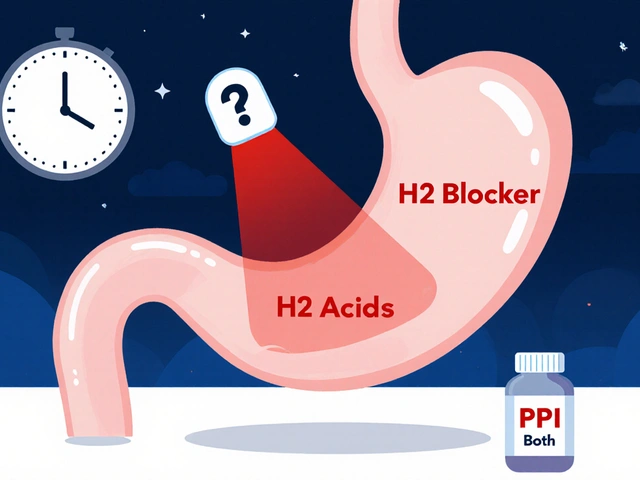Did you know that when it comes to taking care of your heart, certain medications can make a big difference? One such medication is Trimetazidine. It's not a magic pill, but it's definitely turning heads in the world of heart health.
So, what exactly is Trimetazidine? It's a drug that's mainly used to help reduce the symptoms of angina, a kind of chest pain that happens when your heart doesn't get enough blood. It doesn't just stop there—it works at a cellular level to help your heart muscle use oxygen more efficiently.
Now, before you get too excited, it's important to know how this medication fits into the bigger picture of heart health. It's often prescribed to people who need a little extra help managing their symptoms alongside other treatments. But don't worry, we're going to dive into how it all works, its benefits, and what you need to watch out for.
- What is Trimetazidine?
- How Trimetazidine Works
- Benefits for Heart Patients
- Potential Side Effects
- Tips for Safe Use
- The Future of Heart Medication
What is Trimetazidine?
Alright, let's break it down. Trimetazidine is a medication primarily used to manage certain heart conditions, especially in patients having issues like angina. Angina is basically when you feel chest pain because your heart isn't getting enough oxygen-rich blood.
Now, what makes this drug different? While other medications focus on improving blood flow or reducing heart rate, Trimetazidine helps the heart cells make better use of oxygen. It changes how your heart cells metabolize—fancy term, but it's just about how they handle energy. This way, your heart can perform efficiently even if the blood supply is a bit limited.
How Does It Really Work?
Let's get a bit technical. Trimetazidine inhibits an enzyme called “3-KAT” (3-ketoacyl CoA thiolase) in the cells. By doing this, it encourages the heart cells to switch from breaking down fatty acids to glucose for energy, which requires less oxygen. In simple terms, your heart needs less fuel to function, reducing the workload and thus alleviating the pesky chest pain.
Commonly Prescribed For
It's usually a go-to for folks with stable angina who don't respond well to first-line treatments like beta-blockers or calcium channel blockers. Physicians might suggest it as an add-on therapy to keep symptoms in check.
Interesting Tidbit
Did you know that studies have shown Trimetazidine to help more than just the heart? There are ongoing investigations into its potential neuroprotective effects, as it has shown some promise in treating conditions like Parkinson's. Who knew this heart med could possibly influence our brains too?
In the end, while Trimetazidine is not the right fit for everyone's heart treatment plan, it offers substantial benefits for a segment of patients dealing with angina. Always consult with a healthcare provider to see if it's right for you.
How Trimetazidine Works
Ever wonder how Trimetazidine actually helps your heart? It’s got a pretty cool mechanism behind it. Let’s break it down so it’s easy to understand.
Trimetazidine primarily acts by optimizing the heart cells' metabolism. In simpler terms, it helps your heart make better use of the oxygen it gets. Normally, your heart muscles rely heavily on fatty acids, but this requires a lot of oxygen. When your heart is already struggling, that's not the most efficient way to go about it.
Switching to Glucose
Here’s where Trimetazidine comes in. It shifts metabolism from fatty acids to glucose. Why does this matter? Well, burning glucose uses less oxygen compared to fatty acids. This switch means your heart muscles need less oxygen to function effectively, helping ease the burden during those times it's under stress.
By making this switch in fuel usage, Trimetazidine helps reduce chest pain and other symptoms people with angina often feel. So, it’s not just about pumping meds—it's about making your heart work smarter, not harder.
The Dual Benefit
Besides metabolic efficiency, Trimetazidine also protects against cellular damage. Long-term angina can hurt the heart cells, so lessening that damage is a big win.
In summary, by helping your heart use oxygen more wisely and keeping it from damage, Trimetazidine supports your overall heart health. This might be why it’s becoming a preferred choice for those dealing with heart issues like angina.
| Effects | Description |
|---|---|
| Oxygen Efficiency | Improves how heart uses available oxygen |
| Cell Protection | Reduces cellular damage over time |
| Symptom Relief | Eases chest pain, enhancing quality of life |
Benefits for Heart Patients
If you're dealing with heart issues, specifically angina, Trimetazidine might be just what you need. It helps the heart muscle improve its efficiency, especially in low oxygen scenarios. How does it do that? By switching the energy-producing metabolism in your cells from fatty acids to glucose, which needs less oxygen.
This can mean fewer angina attacks, letting you enjoy daily activities without that nagging chest pain. Here are a few more reasons why heart patients find it beneficial:
Improve Exercise Capacity
Nobody likes to feel out of breath after a short walk to the store. Trimetazidine can make those little trips easier, increasing the span of activities you can participate in without discomfort.
Reduced Hospital Visits
By controlling symptoms better, there's a chance you might find yourself at the hospital less often. This can be a huge relief, both mentally and financially.
Enhanced Quality of Life
With fewer angina episodes, patients often report an improved quality of life. This drug can help manage those unwelcome interruptions and let you focus on what truly matters.
Here's a snapshot of how Trimetazidine can make these improvements tangible:
| Benefit | Potential Improvement |
|---|---|
| Exercise Capacity | Increase by up to 20% |
| Angina Frequency | Reduction by up to 50% |
These benefits, of course, assume that you're using the medication as prescribed by your healthcare provider. Regular check-ups are essential to make any necessary adjustments and ensure the drug is working as intended. So, if you're considering it, or already using it, keep this information in mind to get the most out of your treatment. It could make a real difference!

Potential Side Effects
Whenever you're taking any medication, knowing the potential side effects is just as important as knowing the benefits. Trimetazidine is generally safe, but like anything, it's got its quirks.
Common Side Effects
Most people don't experience serious issues, but some common side effects include dizziness, headaches, and feeling a bit lightheaded. If you think about it, these are pretty typical for many medications, so while they’re worth noting, they're often manageable.
Less Common Reactions
Every so often you might hear about someone having unusual side effects. These can involve gastrointestinal issues like nausea or vomiting. It's less common, but worth being on the lookout for.
Serious Side Effects
Serious side effects are rare, but not impossible. If you ever feel your heart racing more than usual or experience difficulty breathing, you should seek medical help straight away.
Handling Side Effects
How do you deal with these if they come up? Well, keeping your doctor in the loop is key. They can adjust your dosage or suggest other ways to manage any bothersome symptoms. Sometimes, it's just a matter of giving your body some time to adjust.
Inform Your Doctor
One tip—always let your healthcare provider know about any other medications or supplements you take. This helps them prevent any potential conflicts that might make side effects worse.
In the grand scheme of things, Trimetazidine is considered a solid option for heart patients, particularly those looking for something to ease their angina symptoms. Being aware of what might happen helps you use it with confidence and stay on top of your heart health plan.
Tips for Safe Use
When it comes to using Trimetazidine, the goal is to make sure it's working safely and effectively for you. Here are some handy pointers to keep in mind:
1. Follow Your Doctor's Advice
Your doctor knows your health best, so it's crucial to stick to their instructions when taking any medication, including Trimetazidine. This means taking the correct dose at the right times.
2. Be Aware of Potential Side Effects
Like any other medication, Trimetazidine may come with some side effects. Common ones include dizziness and headaches. If you notice anything unusual, don't hesitate to call your doctor.
3. Keep an Eye on Interactions
Always inform your healthcare provider about any other medications you're taking. Some drugs might interact with Trimetazidine, so it's good to check.
4. No Skipping Doses
Consistency is key. Make sure you're taking Trimetazidine as prescribed to get the full benefit.
5. Store It Properly
Keep your medication in a cool, dry place, away from direct sunlight. And of course, keep it out of reach of children.
6. Regular Check-Ups
Regular follow-ups with your doctor are essential. They'll monitor your progress and adjust treatment if needed.
Remember, the aim of using Trimetazidine is to help you live more comfortably with your heart condition, so these little steps can make a big difference!
The Future of Heart Medication
The world of heart medication is moving fast, and it's not just about popping a pill anymore. Thanks to advances in science and technology, we're seeing new treatments on the horizon that could spell big changes for those with heart conditions.
One of the most exciting developments is in the field of personalized medicine. Imagine getting a medication that's tailored specifically to your genetic makeup. This approach aims to ensure that people get the most effective treatment with the least risk of side effects. Scientists are already studying how variations in our genes can affect how we respond to drugs like Trimetazidine and other heart medications.
Nanotechnology – Tiny Fighters for Heart Health
Another area gaining traction is nanotechnology. We're talking about super small particles that can target specific areas in the body. In terms of heart health, these tiny warriors could potentially deliver cardiovascular treatments directly to the heart tissue, making them more effective and reducing unwanted effects elsewhere in the body.
AI and Machine Learning
AI isn't just for robots and self-driving cars anymore. In the medical world, AI and machine learning are helping doctors predict which treatments will work best for specific patients. This tech could optimize the use of medications like Trimetazidine, offering new insights into how they might work best for each individual. It's a bit like having a supercomputer in your medical team.
And there's more. Biomedical research is expanding our understanding of heart disease at an unprecedented rate. For example, researchers are exploring how better to mimic the heart's natural processes in medications, aiming for new drugs that could repair damage or improve function in ways we've never been able to before.
What This Means for Heart Patients
For those living with heart conditions, these advances mean there's hope for more efficient and safer treatments down the line. It's likely that medications like Trimetazidine will continue to evolve, improving quality of life for those managing conditions like angina.
In summary, the future of heart medication looks promising. With a mix of personalized treatments, advanced technology, and smarter drugs, we're on the brink of a revolution in heart care that could transform how we approach cardiovascular health.








Pat Davis March 21, 2025
Trimetazidine, as elucidated in the recent overview, represents a noteworthy advancement in the management of stable angina, particularly for patients whose symptoms persist despite conventional therapy. The pharmacological profile of this agent underscores its capacity to modulate myocardial metabolism, thereby enhancing oxygen efficiency at the cellular level. Clinical investigations have consistently demonstrated a reduction in angina frequency, with some studies reporting up to a fifty percent decrease in symptomatic episodes. Moreover, the drug’s impact on exercise tolerance cannot be overstated; patients often experience a measurable increase in functional capacity, which translates to an improved quality of life. It is imperative to recognize that Trimetazidine is not intended as a monotherapy but rather as an adjunct to established anti‑anginal regimens, complementing beta‑blockers and calcium channel blockers. Safety considerations remain paramount; while the incidence of serious adverse events is low, clinicians must remain vigilant for dizziness, headaches, and occasional gastrointestinal disturbances. The therapeutic window is favorable, and dose titration should be guided by individual patient response and tolerance. By fostering a shift from fatty acid oxidation to glucose utilization, the drug reduces myocardial oxygen demand, a mechanism that aligns with contemporary understandings of metabolic cardiology. In addition, emerging data hint at neuroprotective properties, suggesting potential benefits beyond the cardiovascular sphere. Patients should be counseled on the importance of adherence, as irregular intake may compromise efficacy. Regular follow‑up appointments enable healthcare providers to monitor clinical outcomes and adjust treatment plans accordingly. The integration of Trimetazidine into a comprehensive care model exemplifies a patient‑centered approach, emphasizing both symptom relief and functional improvement. Ultimately, the decision to incorporate this medication must be individualized, taking into account comorbid conditions, concurrent therapies, and patient preferences. As healthcare practitioners, we bear the responsibility of staying abreast of evolving evidence to optimize therapeutic strategies. In conclusion, Trimetazidine offers a valuable tool in the cardiologist’s armamentarium, provided it is used judiciously and monitored closely.
Mary Wrobel March 24, 2025
Wow, this deep dive into Trimetazidine really paints a vivid picture of its role in heart health! I love how the article breaks down the science into bite‑size, relatable pieces – it feels like a friendly chat over coffee. The way it highlights the shift to glucose metabolism is especially cool, making the heart feel like it’s getting a smarter fuel. If you’re navigating angina, this could be a game‑changer, and the practical tips are spot‑on for everyday use.
Lauren Ulm March 27, 2025
Ever wonder why the pharma giants keep quiet about the hidden side of Trimetazidine? 🤔 Some whisper that it’s part of a larger agenda to steer metabolic control into the hands of a few. Yet, the scientific community drops crumbs about its neuro‑protective angles, almost as if hinting at dual‑purpose designs. 🌐 While we’re told it’s just another heart drug, the subtle modulation of energy pathways could be a foothold for broader bio‑engineering projects. Stay alert, friends – every molecule has a story beyond the label. 🧩
Michael Mendelson March 31, 2025
Honestly, the hype around Trimetazidine reeks of trendy med‑marketing fluff. I mean, “shifts metabolism” sounds fancy, but does it actually cure the deepest moral rot in our society? People act like any pill can fix the root causes of cardiovascular disease, ignoring lifestyle sins. The whole narrative feels like a sugar‑coated moral lecture packaged as science. If you’re looking for a quick fix, you’re probably chasing a phantom.
Ibrahim Lawan April 3, 2025
Colleagues, let us consider Trimetazidine as a coach for the heart, guiding it toward more efficient performance. By encouraging glucose utilization, it aligns with the principle of economic energy expenditure, fostering resilience under stress. This metabolic adaptation supports not only symptom relief but also the broader goal of preserving myocardial integrity. Patients who engage with their treatment plans thoughtfully often experience the most profound benefits. Let us continue to monitor outcomes with the rigor that our profession demands.
Just Sarah April 7, 2025
Indeed, the mechanisms described warrant a thorough examination; however, one must also contemplate the broader clinical implications, especially regarding individualized patient response; therefore, a systematic approach to titration, monitoring, and interdisciplinary consultation is advisable, ensuring optimal therapeutic outcomes.
Anthony Cannon April 10, 2025
Trimetazidine provides an added option for angina management; it complements existing therapies and can improve patient activity levels.
Kristie Barnes April 14, 2025
Interesting insights.